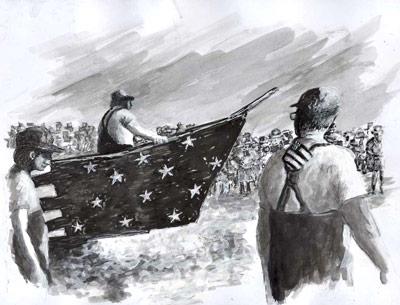A Tale of the Haulseining Days

Let’s start with the upbeat. Marsha King’s Kickstarter campaign in support of her forthcoming self-published book, “A Fine Day for Fishing,” surpassed its goal. The increasingly popular fund-raising tool in this brave new world of do-it-yourself brought in 79 contributors and more than $3,500 in pledges before wrapping up on Nov. 1.
That means the print run will be completed and come Nov. 23 the book, a fictionalized history of the end of the haulseining way of life in East Hampton, will be for sale at the Marine Museum in Amagansett. Each $10 purchase of a copy will benefit the East Hampton Town Baymen’s Association’s emergency medical fund.
Events that day, a Saturday, will run from 10 a.m. to 4 p.m., offering bayman-guided tours of the museum and tales of the freewheeling old days of dories plowing into the surf and nets cast for striped bass, “the money fish.” Students from East Hampton High will film it all for posterity.
Aside from the obvious, the Marine Museum is precisely the right place for this book launch because it’s where the author’s husband, Capt. Dan King, then of Springs and a former 20-year president of the baymen’s association, deposited his now iconic flag dory before moving to North Carolina in 2004. In doing so he left behind the area his family had called home for about the same amount of time haulseining had been practiced here before a new regulatory regime begun in the 1980s essentially killed it — roughly 300 years.
“Well, the climate is kinder, and the cost of living is kinder,” Ms. King said last week of her new home in the southeastern corner of the state, in Hampstead, “the fishing capital of North Carolina.”
“We can afford it here, but it’s not anywhere near as beautiful. East Hampton is one of the most beautiful places in the world. Here you’ve got billboards and stilt houses. But . . . it’s just geography.”
A kind of cognitive dissonance sets in upon her return. “I do miss East Hampton. The East Hampton I remember. But when I visit, and we’re there more than a day or so, we’ll look at each other and say, ‘I don’t want to be here.’ ”
The place has changed. “A Fine Day for Fishing” looks back at a time that was simpler but also just beginning to feel the mysteriously sourced downward economic pressures that squeezed regular folks, eroded leisure time, undercut civic-mindedness — you name it.
In the book’s introduction, Mike Smith, who grew up in East Hampton and went on to be a “sailing captain, tankerman, and maritime writer,” calls it a “glimpse of a lifestyle once cherished,” told from the “viewpoint of a boy watching his future slip away. It’s a cautionary tale of what happens when people with wealth and power decide you’ve got something they want.”
“I drew in the tensions between locals and city people,” Ms. King said. “It’s all there, the brown tide, the [regulatory] fight in Washington, the politicians and the horrible things they said: ‘You can always get a job changing bedsheets at a motel.’ People will know who I mean.”
Fifteen years in the making, the book is “historical fiction but uses true stories” and composite characters, Ms. King said. Its stories are drawn from two sources: what her husband has told her and East Hampton Historical Society archives, specifically the oral histories recorded by John Eilertsen, a folklorist who is now the director of the Bridgehampton Museum, at the behest of Adelaide de Menil — the same histories in “Men’s Lives,” Peter Matthiessen’s 1986 book.
Passages from Mr. Eilertsen’s interviews are sprinkled verbatim throughout “A Fine Day for Fishing,” from Jens Lester and Timmy Kromer’s vertical dory ride up a wave before getting dumped, “heavy waders and all,” in the drink, to Linda and Bill Leland’s boat-bound argument over which among a mess of nets to throw overboard — “color-code ’em or something,” she yells.
“I’ve heard it brings back childhoods for readers,” Ms. King said. “I hope local people will recognize their own stories. I hope people will remember the heartache and joy, when five or six men would spend all their time together down at the beach, having a good time together but also working really hard. And it’s all gone.”
